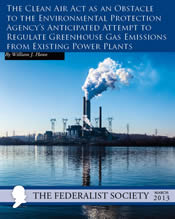
Volume 14: Issue 2
The Clean Air Act as an Obstacle to the Environmental Protection Agency’s Anticipated Attempt to Regulate Greenhouse Gas Emissions from Existing Power Plants

 For roughly two decades, the bipartisan consensus of the U.S. Congress on the regulation of greenhouse gases from non-mobile sources has been that it's best to let sleeping dogs lie. Critics of any attempted regulation have cited a variety of prudential and legal problems that would prevent the Environmental Protection Agency from using the Clean Air Act (CAA)--the awkward basis for current greenhouse gas regulation--to regulate emissions standards from "stationary sources" of energy. Nevertheless, President Obama has asserted that the needs in this area are great, that "Americans cannot resist this transition," and the EPA is thus expected to propose such regulations. Can the CAA, previously limited to existing-source emissions of relatively rare substances, be read to now authorize the regulation of greenhouse gases from non-mobile sources?
For roughly two decades, the bipartisan consensus of the U.S. Congress on the regulation of greenhouse gases from non-mobile sources has been that it's best to let sleeping dogs lie. Critics of any attempted regulation have cited a variety of prudential and legal problems that would prevent the Environmental Protection Agency from using the Clean Air Act (CAA)--the awkward basis for current greenhouse gas regulation--to regulate emissions standards from "stationary sources" of energy. Nevertheless, President Obama has asserted that the needs in this area are great, that "Americans cannot resist this transition," and the EPA is thus expected to propose such regulations. Can the CAA, previously limited to existing-source emissions of relatively rare substances, be read to now authorize the regulation of greenhouse gases from non-mobile sources?


